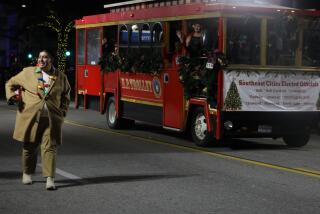Race Issue Becomes a Subtext in Holden Trial : Courts: Case is about sexual harassment, but backgrounds of Jewish plaintiff and black councilman and black co-workers keep coming up.
- Share via
The lawsuit against Los Angeles City Councilman Nate Holden is officially about sexual harassment, but the thorny issue of race has been a persistent subtext.
Holden, 66, is one of the city’s most prominent African American leaders. His accuser, former receptionist Marlee M. Beyda, is a Sephardic Jew who grew up in an Orthodox enclave in Brooklyn and was the only white person working in Holden’s district office.
Originally, Beyda included racial, ethnic and religious discrimination in her lawsuit against the city, though she dropped those allegations before the high-profile trial began a month ago. Now, both sides insist that race should be irrelevant.
Yet in America’s most diverse city--where a series of explosive court cases, from Rodney G. King to O.J. Simpson, have exposed simmering racial tensions--the issue of race keeps coming up.
When Beyda was hired, Holden assumed that she was a bilingual Latina because of her olive skin and wavy hair. Later, Beyda says she became the de facto “Jewish liaison” for the office.
She tells of feeling left out when she was the only employee not invited to a black colleague’s weekend barbecue. She claims that her black supervisors laughed when she revealed her ethnicity. A black co-worker says she confided that her family had racist views.
A psychologist who treated Beyda after she filed her harassment claim testified that Beyda feared “large black men” and had nightmares about them.
Holden, for his part, keeps reminding observers that he paid his own way to visit Israel and considers himself to have some Jewish ancestry because his mother’s maiden name was Solomon.
“I think that just because of our historical views of racism and the black man and the white woman that it is always at the outer recesses of our minds,” said Assistant City Atty. Wilma Pinder, who is black and defending the city in the case. “It is just the legacy of our American culture.”
Pinder noted that several African American men who never met Holden before have begun attending the trial daily, wearing “Million Man March” pins on their lapels and escorting the councilman and his attorneys through the hallways.
“What I think those men, in their own minds, feel is, here is one of the few prominent black males being attacked, and we are going to step to the forefront and offer him our protection” Pinder said. “In the black community . . . there is [always] a concern that there’s something afoot to tarnish or discredit black leaders.”
Other lawyers in the case, and Holden himself, are adamant that they are not purposely injecting race into the case, but each accuses the other side of doing so. With the legacy of the Simpson murder trial so fresh, all the parties said they are loathe to even discuss race for fear of further dividing the community.
“People are so sensitive. There’s been enough discussed about race already,” said the lawmaker, who was born in the segregated South and filed a racial discrimination complaint when he was laid off from Hughes aircraft. “My goal and objective is to bring people together. This case should go up and down on evidence, not on some intangible concept about how someone else is feeling about another person.”
Jack O’Donnell, one of Beyda’s lawyers, said the plaintiff’s team decided to drop the race and religion aspects of their claim because “this city doesn’t need any more race issues.” Besides, co-counsel Dan Stormer describes Holden as “an equal opportunity harasser,” noting that the other two women who accused him of harassment--one of whom has a pending lawsuit--are both African American.
Regardless of intent, the testimony has included a string of anecdotes with racial overtones.
In Beyda’s pretrial deposition, Holden attorney Skip Miller asked her if working in an office where everyone was African American made her uncomfortable. “Sometimes, yes,” she said.
Defense attorneys raised questions about why Beyda once signed a note to her boss, “the Jew from the district office,” and the plaintiff responded: “I was always referred to as the Jew.”
On the stand, she described the lonely isolation that started when she was the only staffer not invited to a barbecue thrown by Ira Massey--an older black man who is now one of four individual defendants in the suit--and was reinforced by her direct supervisor, Geneva Cox.
“Geneva Cox let me know [on several occasions] that the councilman only had me there because I was a Jew,” Beyda testified. “When a lady walked into the office and asked me if I was related to Mrs. Cox and Mrs. Cox overheard the conversation, Mrs. Cox laughed and said, ‘Oh no, I’m not related to her, she’s a Jew.’ That was uncomfortable.”
According to Beyda, race reared its head during her initial job interview with Holden and his then-chief of staff, Herb Wesson, who is black.
“They asked me, ‘What am I?’ I said, ‘I’m American,’ ” she recalled in a quiet deadpan. “The councilman asked, ‘What are you?’ I said, ‘My ancestry is Russian and Syrian.’ The councilman said, ‘What are you?’ I said, ‘I’m a Jew.’ The councilman and Herb Wesson laughed.”
Within a few days her background came up again, when a constituent who spoke only Spanish called Holden’s office. Both Holden and Beyda have recounted this incident on the stand similarly: Holden told another employee to pass the phone to the new hire, and Beyda protested that she did not know the language.
“By appearance, she was a little darker, a little browner, I just made the assumption that she was Hispanic,” he explained. “I said, ‘Marlee, you don’t speak Spanish?’ Marlee turned to me and said, ‘I don’t speak Spanish, I’m not Spanish.’ I said, ‘You’re not?’ She said no. Well, so much for that.”
Even as Beyda explained that colleague John Friarson never mistreated her, race came up.
“He told me, ‘I’m not interested in white meat. I like dark meat and you’re white meat,’ “she recalled. “So we had an agreement that he wouldn’t come after me.”
The references to race, though pervasive, have also been subtle and Superior Court Judge Raymond D. Mireles, who is hearing the case without a jury, has rarely allowed the attorneys to tread far in that vein. Had there been a jury, lawyers on both sides agree, race would have been stressed more. Pinder planned to question potential jurors extensively on racial issues, and Stormer said he believes his opposition hoped for a jury with several African American members and that their “plan was to make a race issue.”
But Miller insists that “race is irrelevant.”
“From Holden’s standpoint, race certainly never was and never will be an issue in the way he runs his affairs,” he said. “He treats people based on quality and loyalty. He interacts with people of all races and religions.”
Raphael Sonenshein, a political scientist and author of a book on racial politics in Los Angeles, said that Holden has long had close ties to the city’s Jewish community, but tends to focus on his African American identity when he runs into political trouble.
He noted that Supreme Court Justice Clarence Thomas rescued his nomination from a sexual harassment scandal in part by calling his widely publicized confirmation hearings “a high-tech lynching.”
“Thomas basically was on the edge of disaster until he played the race card. It gave him support in the black community and it puts whites on the defensive. He came back with a political defense on race,” Sonenshein said. “Race is a pretty omnipresent thing in our society. It gets used strategically by a lot of people.”
More to Read
Sign up for Essential California
The most important California stories and recommendations in your inbox every morning.
You may occasionally receive promotional content from the Los Angeles Times.










